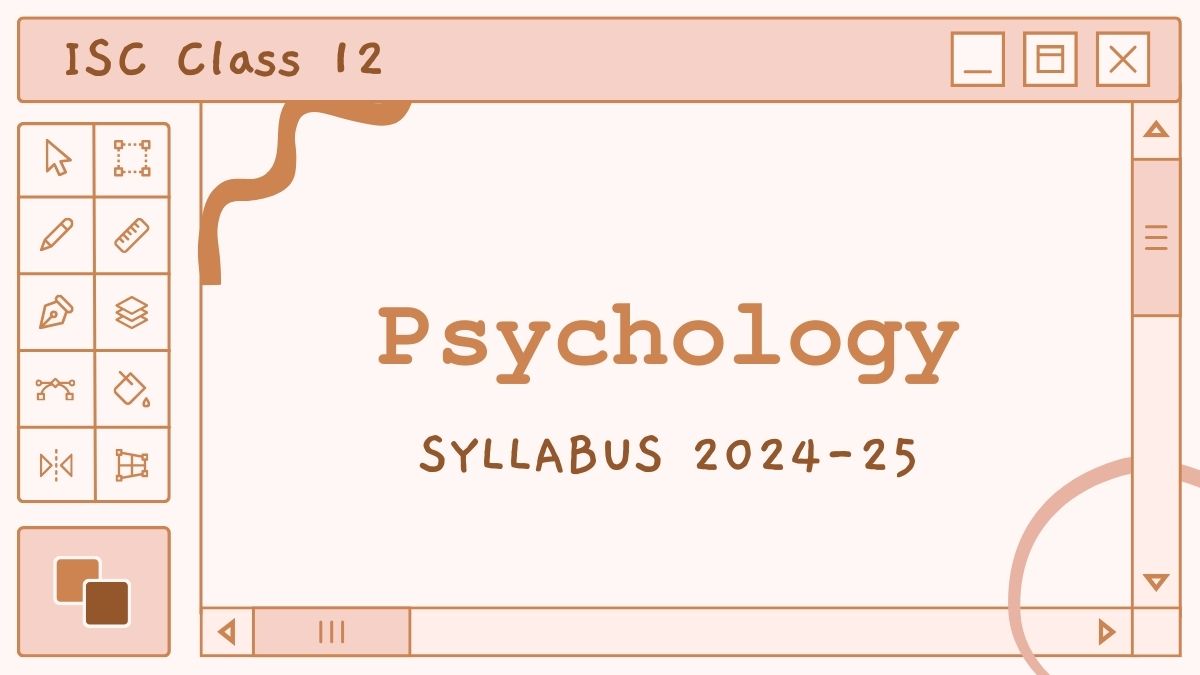ISC Class 12 Psychology Syllabus 2024-25
The ISC Class 12 Psychology Syllabus for the academic year 2024-25 covers a wide range of topics, including intelligence, personality, lifespan development, stress, psychological disorders, and social behavior. It also includes practical work where students apply theories and conduct studies. The syllabus encourages a deeper understanding of mental processes and behavior through theory and practical exposure.
Revised ISC Class 12 Psychology Syllabus 2024-25
This syllabus is divided into two sections:
- Paper I: Theory – 70 Marks
- Paper II: Practical Work – 30 Marks
Paper I (Theory) – 70 Marks
1. Intelligence and Ability
- Intelligence: Definition, theories, and types of intelligence (Spearman, Thurstone, Cattell, Sternberg, Gardner).
- Measurement: IQ concept, individual and group tests (Wechsler-III, Raven’s Matrices).
- Emotional Intelligence: Characteristics of emotionally intelligent people.
- Aptitude, Achievement, and Interest: Definitions and reasons for assessment, tools like GATB and Achievement Tests.
2. Personality
- Definition: Personality definitions by Allport, related terms like temperament, trait, and self-concept.
- Theories: Psychoanalytic (Freud), Humanistic (Rogers, Maslow), Trait (Allport, Cattell), Type theories (Sheldon, Hippocrates), and Bandura’s Social Learning Theory.
- Assessment: Self-reports (MMPI), projective techniques (Rorschach, TAT), and behavioral analysis.
3. Lifespan Development
- Development, Growth, and Maturation: Importance of studying lifespan development, heredity, and environment.
- Infancy: Motor milestones, reflexes, and Piaget’s Sensory Motor Stage.
- Childhood: Gross and fine motor skills, Piaget’s Preoperational and Concrete stages.
- Adolescence: Puberty, Piaget’s Formal Operational Stage, identity formation, and concerns like delinquency and substance abuse.
4. Stress and Stress Management
- Definition and Types: Psychological, physical, and environmental stressors.
- Effects on Health: Impact on immune system, heart problems, ulcers, and burnout.
- Management: Effective strategies like relaxation, biofeedback, yoga, and promoting positive health.
5. Psychological Disorders and Psychotherapy
- Abnormal Behavior: Classification (DSM-IV) and perspectives.
- Disorders: Anxiety, mood, personality disorders, and schizophrenia.
- Therapies: Psychoanalysis, client-centered, behavioral, and cognitive-behavioral therapies.
6. Social Thought and Social Behavior
- Attribution: Understanding others’ behavior, biases (self-serving bias, false consensus).
- Social Influence: Group dynamics, conformity, and obedience (Asch’s study, Milgram’s experiment).
7. Attitudes
- Definition: Components and formation of attitudes.
- Prejudice: Causes of prejudice and ways to combat it.
8. Psychology in Relation to Environment and Social Concerns
- Counseling: Characteristics of a good counselor and communication skills.
- Environmental Effects: Impact on perception, behavior, and stress.
- Promoting Pro-environmental Behavior: Reducing pollution and waste, and promoting sustainable practices.
Paper II (Practical Work) – 30 Marks
Students must complete two practical studies. Each study involves:
- Aim
- Basic Concept: Definition and related theory.
- Method: Sample, data collection, and statistical analysis.
- Results & Discussion
- Conclusion
- Viva
Study Options
- Statistics: Analyze exam results using group comparison and Z-scores.
- Attitudes: Compare attitudes on topics like fashion or lifestyle between different generations or genders.
- Stress: Study causes and effects of stress among school students.
Tables for Key Concepts
| Component | Details |
|---|---|
| Intelligence Tests | Wechsler-III, Raven’s Matrices |
| Personality Theories | Freud, Rogers, Maslow, Allport, Cattell, Bandura |
| Stress Types | Psychological, Physical, Environmental |
| Disorders | Anxiety, Mood, Personality, Schizophrenia |
This syllabus is designed to provide students with a comprehensive understanding of human psychology, emphasizing both theoretical knowledge and practical application.
ISC Class 12 Psychology Syllabus 2024-25 PDF Download
You can download the complete ISC Class 12 Psychology Syllabus for 2024-25 in PDF format from the official ISC website or via the link given below. The syllabus provides detailed information on theory and practical work, helping students prepare for both Paper I (Theory) and Paper II (Practical). It also includes important details about tests, psychological concepts, and various theories that will be covered during the academic year.
ISC Class 12 Psychology Syllabus 2024-25-Click Here To Download PDF
About The Author
Brajesh
Brajesh (MCA, M.Tech (IT)) is a passionate education and career content creator with a strong academic background in Computer Applications (MCA) and Technology (M.Tech). With years of hands-on experience in exam preparation strategies, syllabus analysis, and government job updates, he helps students and aspirants navigate their academic and professional journeys with clarity and confidence.

